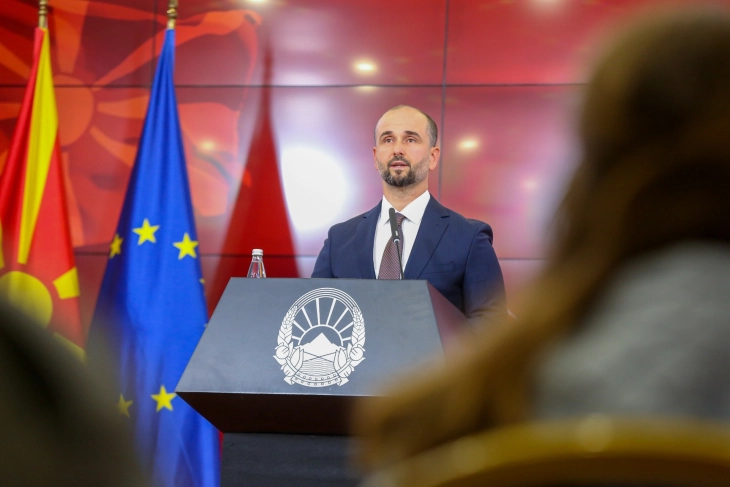Murtezani: Brussels not optimistic, but not rejecting delayed constitutional changes proposal
- Minister of European Affairs and chief negotiator with the EU Orhan Murtezani said Brussels did not seem optimistic about the proposal for delaying the implementation of the constitutional changes until right before the country joins the EU -- but it was not dismissing it outright, either.
- Post By Magdalena Reed
- 15:01, 8 October, 2024

Skopje, 8 October 2024 (MIA) -- Minister of European Affairs and chief negotiator with the EU Orhan Murtezani said Brussels did not seem optimistic about the proposal for delaying the implementation of the constitutional changes until right before the country joins the EU -- but it was not dismissing it outright, either.
"On several occasions, I have publicly said Brussels is not greatly optimistic about the proposal but neither is it rejecting it completely. We should push for solutions that are acceptable to our strategic partners, as well. This is not up to them, but up to us and our willingness and efforts to find solutions," Murtezani told a press conference Tuesday held to mark the government's first 100 days in power.
Asked to comment on Prime Minister Hristijan Mickoski's statement that the state would send a letter presenting potential solutions to the EU, the Europe minister said this meant the government was considering new ideas and talks were ongoing.
"We are working on finding new solutions and this is at the level of internal talks inside the government," he said.
"We don't have a final proposal yet. Even if we had one, we wouldn't announce it before the elections in neighboring Bulgaria are over," he said. "We are not sure if the other side would accept even the best possible plan during this time."
Murtezani declined to share any details regarding the contents of the letter that would be sent to EU institutions.
He said PM Mickoski would hold several more coordination meetings before this was "formulated into some sort of strategy," which would then be sent to the EU and shared with the public. "There is no such letter at the moment," he added.
Asked if any of the ideas being considered included a solution without making constitutional changes, Murtezani said the constitutional changes were not a demand made by Bulgaria but by the EU's 27 member states.
"This was clearly stated in the Council's conclusions," the Europe minister said.
"The government and the prime minister himself said, on several occassions, that adopting the constitutional amendments was not the issue.
"We want to make sure that the process going forward will not be subject to additional blockades."
"Our coalition, Worth It, set a six-month deadline for the government to offer a solution to overcome this crisis. This is the fourth month. When we are closer to the deadline, we will consider the available options and which steps to take," Murtezani said.
He said the state was asking top EU officials to help facilitate the country's talks with Bulgaria.
"It would be easier for us and more reassuring if all this dialogue between Bulgaria and us were facilitated or made possible by our strategic partners," the country's chief negotiatior with the EU said.
According to him, the main message of the EU's separating North Macedonia and Albania on the path to EU membership was that the enlargement process was "still alive and we have to find a solution as soon as possible."
Asked about what guarantees was the EU expected to provide when it had already sent clear signals that it was not offering any guarantees, Murtezani said the government thought that the protocols left plenty of room for additional blockades.
"And if we, the government, think that this risk exists, even if we take this step, we will only kick the blocade down the road," the Europe minister said.
"We need to exhaust all options to obtain some kind of guarantees that we will not be subject to any blockades again. This is not about the EU providing any guarantees. It is our duty to protect the interests of our country and citizens.
"If we see this potential risk, it is better for us to prepare for it now, and eliminate it, than to adopt the constitutional changes and then face another blockade."
Murtezani noted that the country could create its own obstructions if it did not align the judiciary reforms with the EU.
He also said the Good Neighborliness Agreement and the bilateral protocols were subject to different interpretations, so the government was waiting for "a unilateral position from Bulgaria that will also be EU's shared position."
"It is up to us to make sure the process will not be subject to additional blockades," he reiterated.
PM Mickoski said Saturday that he would use various institutonal channels to communicate and work with the European Commission and partners to find a respectful solution in line with national interests. mr/
Фото/видео: Влада







